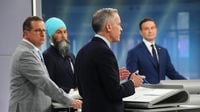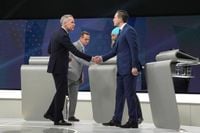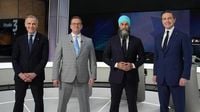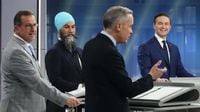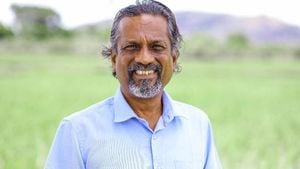On Wednesday evening, April 16, 2025, the leaders of Canada’s four main federal political parties faced off in a French debate broadcast live on Radio-Canada. Mark Carney, the Liberal leader, Pierre Poilievre of the Conservative Party, Jagmeet Singh from the New Democratic Party, and Yves-François Blanchet representing the Bloc Québécois engaged in a lively discussion, while the Green Party, led by Jonathan Pedneault, was notably excluded from the event by the Leaders' Debates Commission.
The debate covered a range of pressing issues including energy projects, the economy, and trade tensions with the United States, particularly under President Donald Trump’s administration. Carney, who has been Prime Minister for less than a month, found himself under intense scrutiny from his rivals. Poilievre accused him of perpetuating the policies of his predecessor, Justin Trudeau, while promising to reverse what he termed detrimental economic policies that have hindered energy development in the country.
Throughout the evening, Carney defended his record, emphasizing that despite his brief tenure, he has already initiated agreements with provincial leaders to eliminate trade barriers. According to political strategist Jonathan Kalles, "The pressure is clearly on Pierre Poilievre, as if he fails to deliver a decisive blow tonight, I don’t know what he has left."
As the debate unfolded, the leaders’ performances were critiqued not only on their political stances but also on their command of the French language. Mark Carney received a D+ for his linguistic skills, with critics noting that while he comprehends questions, his spoken French is challenging to follow due to a strong accent and unclear responses. In contrast, Yves-François Blanchet, as a native French speaker, received an A for his articulate and fluent delivery.
Pierre Poilievre and Jagmeet Singh were rated B and B- respectively. Poilievre’s accent posed some comprehension issues, but he was praised for his choice of words, despite a tendency to mix masculine and feminine forms. Singh, while competent, was advised to slow down his pace to enhance clarity.
The English debate is set to take place on Thursday evening, April 17, 2025, in Montreal, moderated by Steve Paikin of TVO. This event will be critical as it marks the second and final debate before the election scheduled for April 28, 2025. Key themes for the upcoming debate include affordability and the cost of living, energy and climate, leadership in crisis situations, public safety, and tariffs affecting Canada.
Political analysts predict that Carney will continue to be the primary target of attacks during this debate, especially after he emerged from the French debate relatively unscathed. The English debate will be broadcast live and translated into French and Inuktitut, reflecting the diverse linguistic landscape of Canada.
Meanwhile, the exclusion of the Green Party from the debates has sparked significant backlash. Jonathan Pedneault has called for the resignation of the Leaders' Debates Commission, claiming that the decision was unjust and that the Green Party is currently evaluating legal options to contest their exclusion. Michel Cormier, the commission's director, defended the ruling, stating that the Green Party had deliberately excluded candidates from its already limited list, thereby failing to meet eligibility criteria.
In a press briefing, Pedneault outlined the party's ambitious platform, which includes plans to end the sale of gasoline vehicles by 2023 and to exempt all new and used carbon-neutral vehicles from the Goods and Services Tax (GST). The Green Party aims for complete carbon neutrality in public transportation by 2040, focusing on rail transport, and proposes an international tax on aviation and maritime fuel to ensure these industries contribute to environmental efforts.
As the campaign progresses, the Liberal Party, led by Carney, holds a narrow five-point lead over the Conservatives. The political landscape remains competitive, with the leaders of the major parties engaging in strategic maneuvers to sway voters. Carney's recent visit to Schwartz’s deli in Montreal, where he interacted with staff and patrons, highlights his efforts to connect with constituents ahead of the crucial debate.
Throughout the day leading up to the English debate, the leaders have largely maintained a low profile, focusing on preparations for the evening's confrontation. The stakes are high, as this debate will likely shape the final sentiments of voters just days before the election.
The first debate in French raised significant issues, yet some crucial topics, such as the protection of Canada's Arctic region, were notably absent from discussions. With the Arctic representing 40% of Canada’s territory and over 70% of its coastline, it remains a vital area for national security and geopolitical strategy. The upcoming English debate presents an opportunity for candidates to address these important issues.
As the leaders prepare for their second encounter, voters are keenly watching how each party articulates its vision for Canada’s future, particularly in light of pressing economic and environmental challenges. The outcome of these debates could very well influence the direction of the upcoming election and the policies that will shape the country for years to come.

